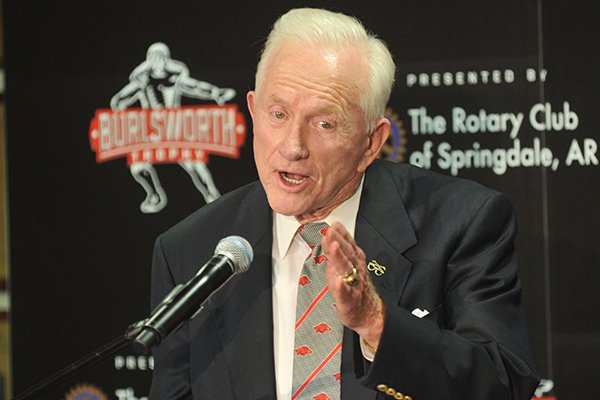Frank Broyles knew two things had to happen if the Arkansas Razorbacks had any hope of competing in the SEC in football.
The facilities race already had begun in 1999 when he broached the subject of adding 20,000 seats to Razorbacks Stadium and giving it more eye appeal.
The director of athletics at the University of Arkansas, Fayetteville also knew to support it and help pay for it he would have to move one of the three games from Little Rock.
First, he would need the approval of the UA board of trustees. In an open forum he met with the board and brought in a model of a stadium that looked like it was out of Star Wars, futuristic with pods running out of it.
There was a stunned silence, and Broyles had it removed. Another model, a classic with beauty and elegance, was brought in and he got his vote. Reynolds Razorback Stadium was born.
Broyles was a great football coach but as director of athletics he was brilliant, a visionary, a fundraiser and perhaps one of the greatest athletic directors in college history.
He raised more than $240 million for physical improvements. Every sports facility was built or updated on his watch.
He flew through a snowstorm to North Carolina to hire Eddie Sutton before Duke could.
He was ahead of his time when he hired Nolan Richardson, who brought a new style of basketball and a national championship.
He recognized the potential in a driver's ed teacher named Norm DeBriyn.
He hired John McDonnell.
He hired so many assistant coaches that went on to success as head coaches that David Bazzel created the Broyles Award for the nation's top assistant.
When he hired a mistake, he fired him. It was never personal. He always believed it was in the best interest of the UA.
A few years ago Jeff Long, who replaced Broyles as athletic director, decided to honor Broyles for more than 50 years of service to the school at halftime of a football game. The invitation was for any player or former assistant who wanted to come down on the field at the half.
They came from all over the world, and Frank Broyles Field was almost covered with the guys who wanted to pay tribute to their mentor.
In 1991 he made a move that would eventually change the landscape of college football. He and the Razorbacks joined the SEC.
Broyles and his best friend Darrell Royal, the former Texas coach and special assistant to the school's president, wanted to make the move together, but Texas had too much power in the Southwest Conference and decided to stay.
South Carolina was added to the move, and the SEC became the first conference to expand and was able to get a $5 million TV deal for its conference championship. There may not be Power 5 conferences and multimillion-dollar TV contracts if Broyles did not have the foresight to move the UA to the SEC.
In his last years, Broyles worked tirelessly for Alzheimer's awareness. His first wife Barbara died from complications of Alzheimer's in 2004, and Royal did as well in 2012. The disease got Broyles on Monday, but not before he established the Broyles Foundation to help teach caregivers of Alzheimer's patients how to cope and deal with the disease.
His book, Coach Broyles' Playbook for Alzheimer's Caregivers, is available through broylesfoundation.com, and more than a million copies have been distributed. It has been published in 11 languages.
Frank Broyles -- football coach, administrator, TV analyst and Arkansas' No. 1 ambassador -- will be missed by legions of fans, but his legacy may live forever.
Sports on 08/16/2017


